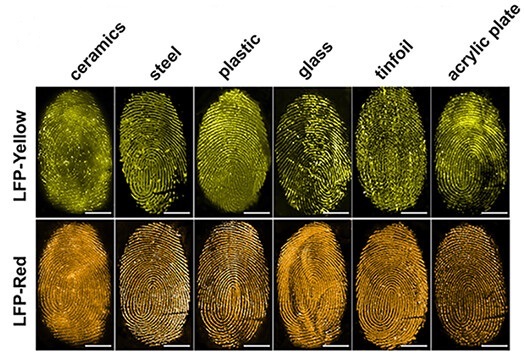Channels
Special Offers & Promotions
Forensics spray uses jellyfish protein to detect fingerprints in ten seconds

Scientists develop biocompatible fluorescent spray that detects fingerprints in ten seconds
Scientists have developed a water soluble, non-toxic fluorescent spray that makes fingerprints visible in just a few seconds, making forensic investigations safer, easier and quicker.
Latent fingerprints (LFPs) are invisible prints formed by sweat or oil left on an object after it’s been touched.
Traditional forensic methods for detecting fingerprints either use toxic powders that can harm DNA evidence, or environmentally damaging petrochemical solvents.
The new dye spray, developed by scientists at the Shanghai Normal University (China) and the University of Bath (UK), is water soluble, exhibits low toxicity and enables rapid visualisation of fingerprints at the crime scene.
They have created two different coloured dyes – called LFP-Yellow and LFP-Red – which bind selectively with the negatively-charged molecules found in fingerprints, locking the dye molecules in place and emitting a fluorescent glow that can be seen under blue light.
The dyes are based on a fluorescent protein found in jellyfish, called Green Fluorescent Protein (GFP), which is used extensively by research scientists to visualise biological processes. This means the dyes are biologically compatible and don’t interfere with subsequent DNA analysis of the fingerprints.
The fine spray prevents splashes that could damage prints, is less messy than a powder and works quickly even on rough surfaces where it is harder to capture fingerprints, such as brick.
Professor Tony James, from the Department of Chemistry at the University of Bath (UK), said: “This system is safer, more sustainable and works faster than existing technologies and can even be used on fingerprints that are a week old.
“Having two different colours available means the spray can be used on different coloured surfaces. We’re hoping to produce more colours in the future.”
Dr Luling Wu, also from the University of Bath (UK), said: “The probes are only weakly fluorescent in aqueous solution, but emit strong fluorescence once they bind to the fingerprints through the interaction between the probes and fatty acids or amino acids.”
While the principal investigator Professor Chusen Huang from Shanghai Normal University in China said that “We hope this technology can really improve the detection of evidence at crime scenes.”
“We are now collaborating with some companies to make our dyes available for sale. Further work is still ongoing.”
Their study is published in the Journal of the American Chemical Society.
The University of Bath is one of the UK's leading universities for high-impact research with a reputation for excellence in education, student experience and graduate prospects.
We are named ‘University of the Year’ in The Times and The Sunday Times Good University Guide 2023, and ranked among the world’s top 10% of universities, placing 148th in the QS World University Rankings 2024. We are ranked 5th in the UK in the Complete University Guide 2024, 6th in the Guardian University Guide 2024 and 8th in the The Times and Sunday Times Good University Guide 2024.
Bath is rated in the world’s top 10 universities for sport in the QS World University Ranking by Subject 2023. We produce some of the world’s most job-ready graduates and were named University of the Year for Graduate Jobs by the Daily Mail University Guide 2024, as well as ranking as one of the world’s top 90 universities for employer reputation according to the QS World University Rankings 2024.
Research from Bath is helping to change the world for the better. Across the University’s three Faculties and School of Management, our research is making an impact in society, leading to low-carbon living, positive digital futures, and improved health and wellbeing.
Media Partners


